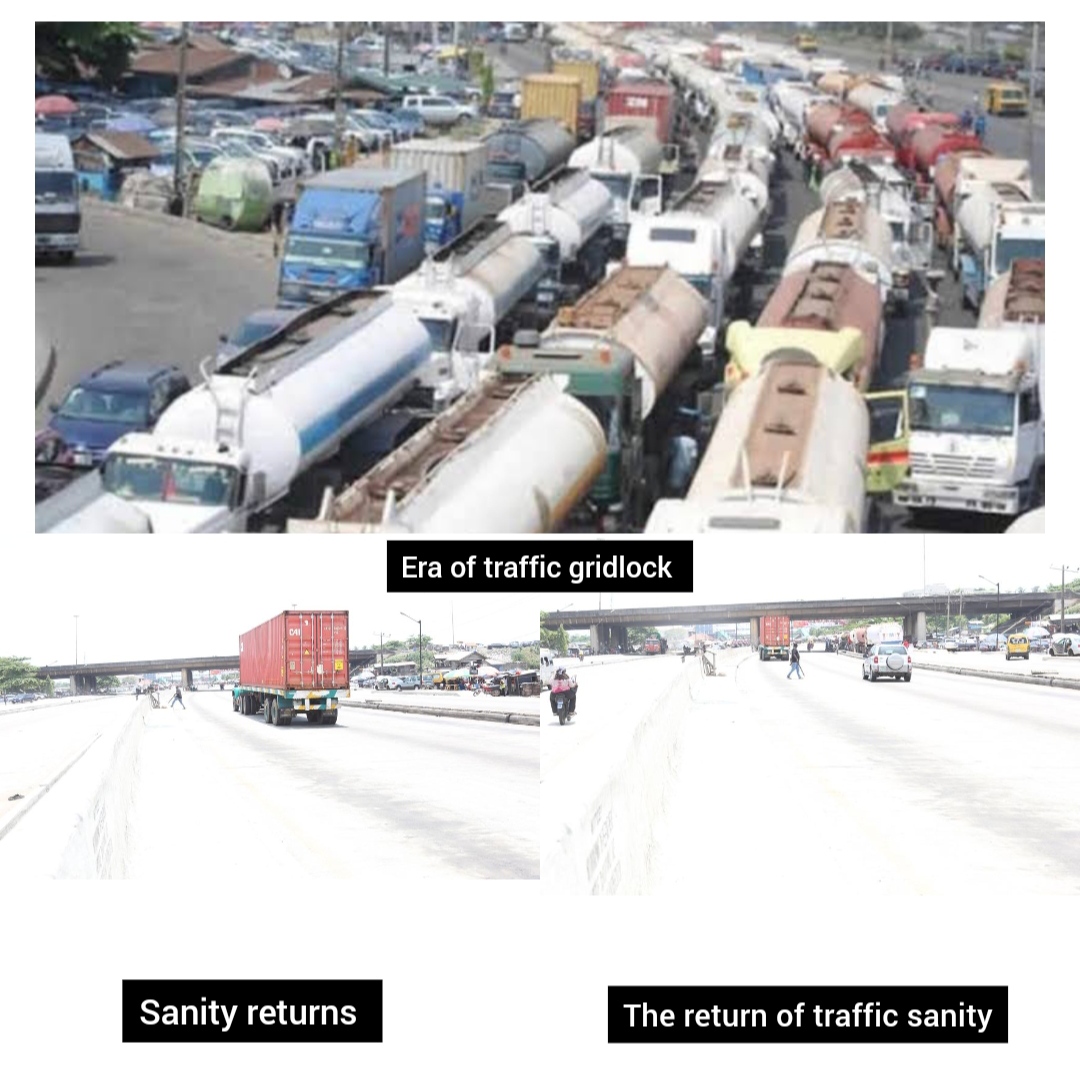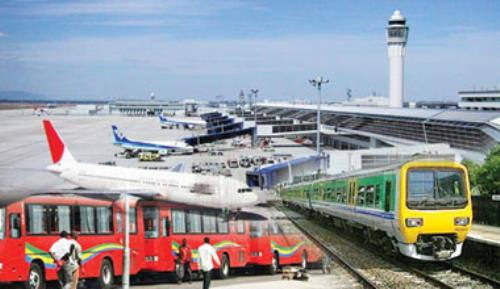ETO: Why Extortion Persists On Lagos Ports Access Roads
By Kenneth Jukpor
When the Nigerian Ports Authority (NPA) commenced the implementation of the electronic call-up system (ETO) for all trucks calling at the nation’s ports on February 27, 2021, it was tipped as one of the biggest milestones to change the narrative of gridlocks, especially at Lagos ports.
ETO signaled the end of the syndicates perpetuated by Nigerian Navy, Army and Police and other security agencies whose attempts to create free flow of traffic became a cash cow for the operatives.
Barely one year later, after several enforcement units have been deployed, ETO is under serious criticisms as truckers continue to groan under massive extortion schemes which may have reached the climax as the Council of Maritime Transport Unions and Associations (COMTUA) has threatened the NPA with legal action over its refusal to address alleged illegal extortions and other corruption activities in the electronic call up system.
Counsel to the union, Ebun-olu Adegboruwa (SAN) made this known in a legal notice sent to the NPA Acting Managing Director, Mohammed Bello-Koko, titled: ‘Notice of Intention to Commence a Suit against the Nigerian Ports Authority Pursuant to Section 92 (1) of the Nigerian Ports Authority ACT CAP 126, LFN 2004’.
The Minister of Transportation, Rotimi Amaechi; Commissioner of Transportation, Lagos State, Frederic Oladeinde and the Truck Transit Park Ltd (TTP) administrators were copied in the notice made available to MMS Plus.
Adegboruwa said the action is informed by the unfair activities and the lack of response to previous letters of complaint written to NPA’s management.
He said the facts presented by the union include reported cases of discrepancies and misrepresentation of facts and figures emanating from the electronic call-up regime created by Truck Transit Park Ltd and breach of agreement on the part of the NPA.
The counsel said while N10, 000 was the agreed amount for the booking process as entry permit into the terminal, the truckers are now charged N31, 250.
He said contrary to the intent and purpose of TTP, which was meant to eradicate payment checkpoints, there has been a proliferation of illegal checkpoints along the terminal routes with attendant extortion of N5, 000 per checkpoint and truck drivers now pay between N50, 000 to N150, 000 to return empty containers at the authorised holding bay.
ETO, a decision to find a permanent solution to the problem of truck congestion in Apapa and also to return sanity to the port environment, hasn’t delivered on its lofty ambitions.
One of the most reported challenges has been the ongoing road reconstruction especially for the Tin Can/ Mile 2 axis where the construction still lingers, but the major factors which led to the dissolution of the Presidential Task Force set up in 2018 by the Federal Government, corruption and extortion, have outlived the various regimes on the roads.
In a bid to ease export operations at Lagos ports, the NPA has officially designated the Lilypond Container Terminal as the final processing centre for all export cargoes heading into the Apapa port, while this is a good development, it underscores the fact an electronic system without the availability of strategic infrastructure wouldn’t yield the desired result.
The Port Manager of Lagos Ports Complex, NPA, Mrs. Olufunmilayo Olotu revealed this recently during a press brief organized by the Apapa Command of Nigeria Customs Service (NCS).
She, however, accused truck drivers of deliberately frustrating the quick dispatch of export containers to the nation’s port, especially the Apapa port
According to Olotu, truck drivers carrying loaded export containers, rather than approach the port directly, now hang around the port corridor looking for more businesses and Terminal Delivery Orders (TDO).
She lamented that despite the fact that the Authority has used several layers of enforcement on the truckers, the act still persists.
According to the Port Manager, the attitude of the truck drivers is affecting the nation’s economy because Nigeria cannot compete effectively among ports in the subregion if its Exports are not delivered in the right quality and quantity.
Her words: “For the export, we are having a present challenge whereby trucks loaded with export goods, on getting to the Creek Road in Apapa, they start turning for TDO’s and refusing to come into the ports.
“For those who are not aware, they would say it is the customs keeping them, this is not true. Everything has been completed, but these people are now looking for a two-in-one transaction. You would see them hanging around port corridors.”
Speaking with MMS Plus, a chieftain at the National Association of Road Transport Owners (NARTO), Alhaji Inuwa Mohammed blamed NPA as part of the regulators responsible for the chaos on the port access roads and within the ports.
His words: “Before now, we know that drivers move to the ports to drop empty containers or pick a consignment and go back to his garage. If there is another arrangement, the truck driver would come back to the ports. However, the introduction of electronic truck call-up and numerous extortion points along port access roads; encourage truckers to hang around in a bid to recoup some of the monies they have spent to get to the port corridor. Some of them believe that if they just go into the ports to drop the empty and return back, they wouldn’t be able to make profit because they have spent a lot.”
According to him, providing a conducive environment without multiple extortion points would encourage truckers to go back to their garages after their business at the ports.
Speaking on the proposal to have Lilypond as an export processing centre, Inuwa noted that NPA had promised this several years ago but didn’t attain it.
“This is the right thing to do but until it’s achieved, we can only hope that it works. It would be a good development because ETO wouldn’t get the desired results if there are no export base or priority locations for exports. We can’t only focus on imports because that’s not good for a nation that wants to develop its economy. There must be emphasis on export and exports shouldn’t suffer the kind of challenges to that imports suffer to exit the ports”
“It’s also important to note that some of these exports are agricultural products and perishable items that are fragile. If Nigeria would grow the non-oil sector with regards to exports, then there must be a fast track and ease of doing business as it affects exports. It’s a good development and we hope that they keep this promise,” he added.
Also speaking, the National President of Africa Association of Professional Freight Forwarders and Logistics of Nigeria (APFFLON), Mr. Frank Ogunojemite appealed to NPA to review the ETO platform, noting that new challenges have emerged since its introduction.
“ETO was introduced last year, but it’s time to repackage it. There are lots of issues linked to ETO and the concept is still novel to the people who have to utilize it. ETO should be simplified to the barest minimum and all traces of extortion and corruption should be removed. The money involved should be as simplified as a toll-gate. You can’t say people are supposed to be only N10,000 yet the users spend more than three times that amount,” he said.
He, however, asserted that ETO wouldn’t solve the nation’s port access problems without the supporting infrastructure, even as he commended the plan to have Lilypond as an export base.
“Lilypond shouldn’t be the only export base. Government should be looking for avenues to decongest Lagos ports. The dry ports across the country should be completed and designated as export bases. Kaduna dry port is already working, it should be used to promote exports. The river ports or shallow ports in Delta, Calabar, Port Harcourt should also be designed to support exports.The rail would have to be viable to support this system because the rail could move thousands of cargoes and it could function at night,” the APFFLON boss argued.








